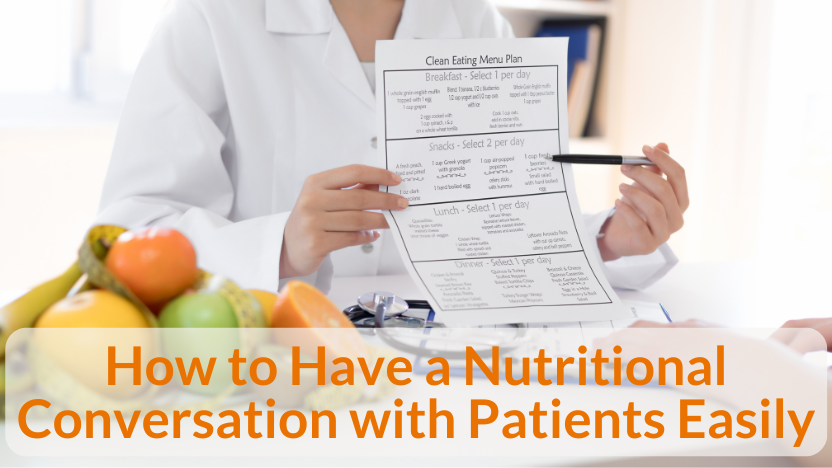3 Ways to Talk Nutrition With Patients
Posted by EyePromise on Oct 24th 2024
For many eye care professionals (ECPs), nutrition can be a difficult subject to broach with patients. However, nutrition is a critical component of eye and overall health, and discussing it with patients should be on every practitioner’s to-do list. Julie Poteet OD, MS, CNS, FOWNS, agrees with this school of thought, and she shared some tips for helping fellow ECPs navigate the nutrition conversation.
Where to Start
First, Dr. Poteet says that eye doctors need to understand the unique opportunity they have to deliver strategies for proactive care and support eye and overall health. “The eyes are known as windows to the body’s health. To not embrace this is a disservice to our patients,” she explains. As with any new protocol, Dr. Poteet recommends keeping it simple, so she uses 3 specific, actionable suggestions for her patients.
Look for Ways to Add Olive Oil and Nuts.

Starting with a small change is the best way to set patients up for success when it comes to transitioning to a healthy lifestyle. Explaining that the Mediterranean diet is the end goal, have patients start with adding a little more olive oil and nuts to their daily diets. Both are rich in healthy fats and antioxidants, making them critical for eye and overall health.
Patients should look for opportunities to substitute their standard cooking or dressing oils with olive oil or incorporate a nutty snack to their afternoons.
Eat In Color.

For many patients, it’s easier (and less expensive) to buy foods that are white/beige in color. Think bread, potatoes, and pastas. However, the standard American diet leaves much to be desired, and many healthcare professionals are asking their patients to get colorful with their diets. More specifically, add colorful fruits and vegetables and dark leafy greens to your daily intake.
Some simple ways to include more colorful foods are swapping a breakfast sandwich for a fruit smoothie with kale added or topping your pancakes with berries.
Frequent Fish.

Dr. Poteet’s final piece of advice for patients: try and eat fatty fish at least twice a week. Fatty fish includes fish oil and fatty acids, which are critical for maintaining several areas of health including eyes, heart, joint, brain, and skin.
To help patients remember which fish “count” for a fatty fish, she uses the acronym “SMASH.”
- Salmon
- Mackerel
- Anchovies
- Sardines
- Herring
Prescribe Nutraceuticals.
Like other healthcare practitioners often hear, Dr. Poteet’s patients ask if they can supplement any of their daily needs. While her answer is yes, supplements can certainly help, she follows this up with a word of caution and a recommendation to do the research.
“Some studies show that up to 68% of over-the-counter fish oils can be rancid.”
However, when you partner with a trusted nutraceutical organization, that work is already done. EyePromise® delivers high quality, natural ingredients in formulations that are clinically proven to deliver results for you and your patients. Furthermore, the entire line of EyePromise nutraceuticals is NSF Contents Tested and Certified, which guarantees that the ingredients that are on the label are in every dose. It also guarantees that those ingredients rise to the rigorous standard set forth by NSF International®.

Some ECPs don’t like the idea of “selling” a nutraceutical to their patients, and we totally understand! When it comes to EyePromise, you’re not selling a random vitamin off the shelf of a convenience store; you’re prescribing a product that has been demonstrated to be effective for the particular issue you’ve seen in your exam. In fact, Russell Crotty, OD, an EyePromise partner, said,
“When prescribing EyePromise nutraceuticals, it's not just that you're trying to get [patients] on a product, it's that you're trying to change the outcome of their vision and their future.”
Another EyePromise partner, Susan Resnick, OD, explained how she prescribes EyePromise to her patients.
“I'll say to [patients], ‘Look, you can't pick your relatives. We know the DNA is set, but let's talk about the modifiable things. We're going to get a measurement of your natural protective pigments.’ Then, I'll follow that with, ‘I have something simple you can do on your own. You're going to take this like a prescription because you're going to use it every day, but it's over the counter.’ And patients get it.”
For Dr. Poteet, the message is simple: Nutrition must be a conversation ECPs are having with their patients. With these simple, actionable tips, you can start helping your patients with their nutritional journeys.

